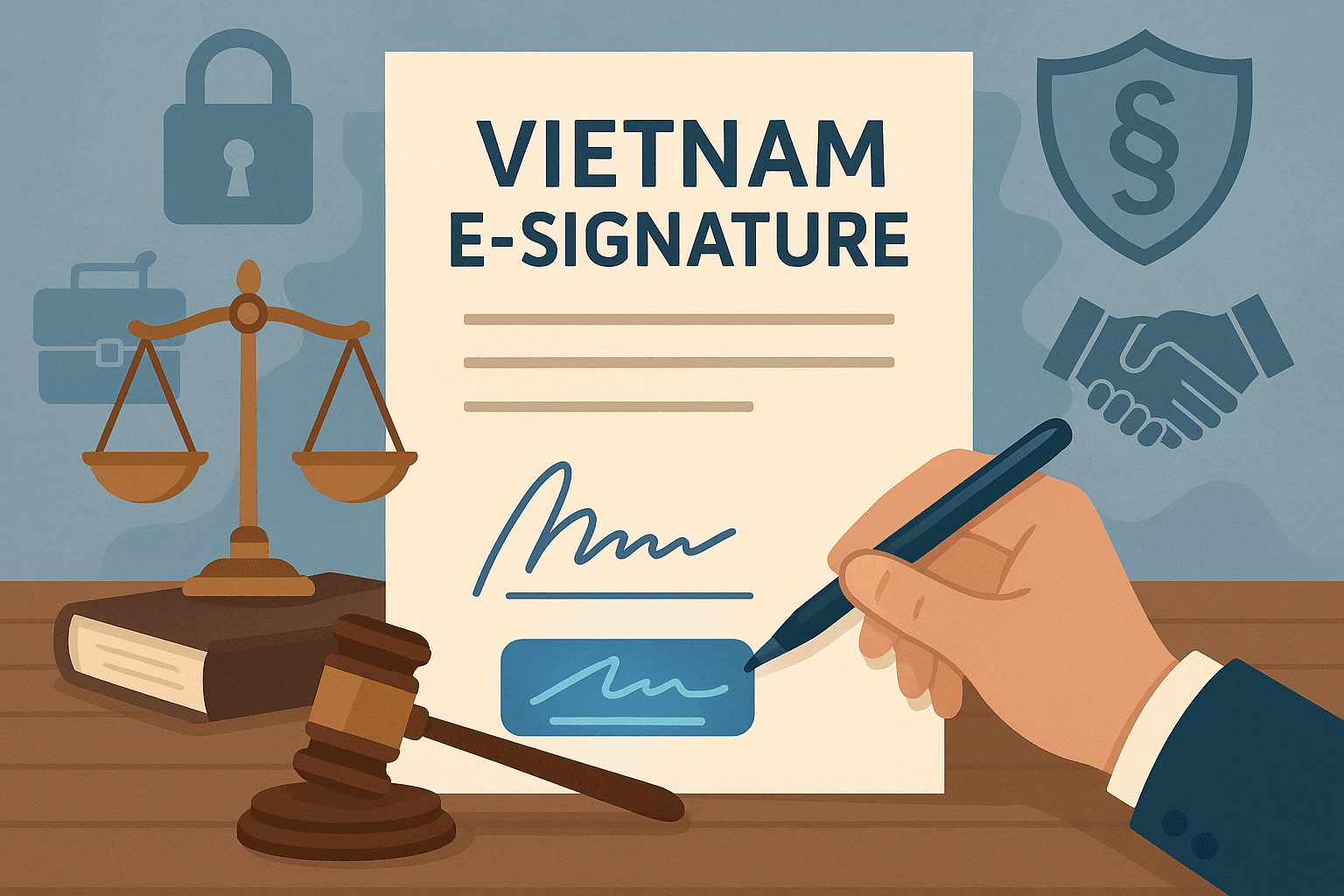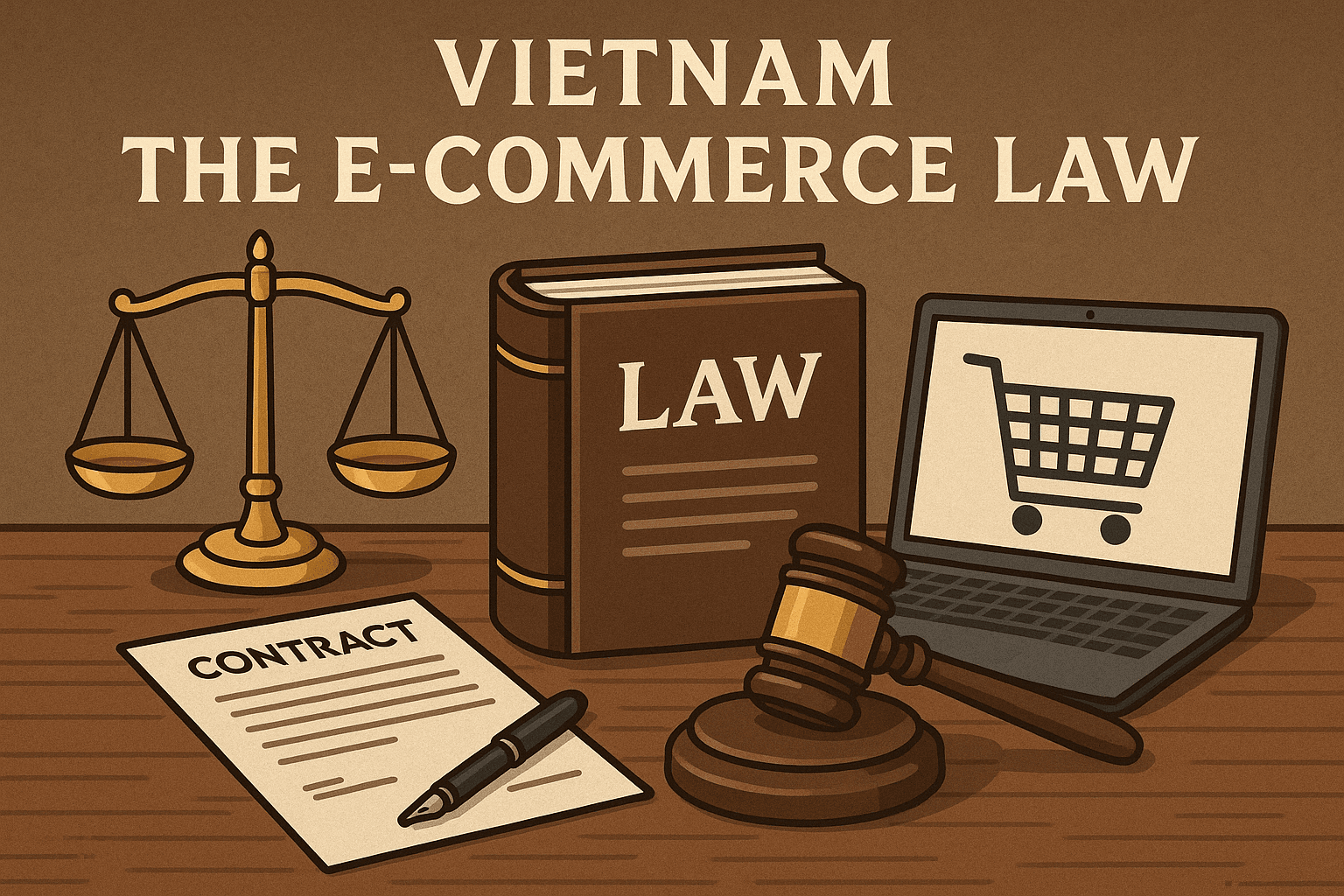WhatsApp or email with our sales team or get in touch with a business development professional in your region.
Comparing Local vs Global E-Sign Providers in Vietnam 2025





Electronic Signature Adoption in Asia: Platforms, Compliance, and Regional Opportunities
As organizations across Asia accelerate their digital transformation strategies in 2025, one area gaining particular traction is the digitization of contractual workflows through electronic signatures. Businesses are under increasing operational pressure to optimize contract turnaround times, reduce manual errors, ensure document integrity, and remain compliant with tightening local e-commerce laws. For many, especially those expanding regionally or digitally onboarding partners and customers, a secure, compliant, and scalable e-signature solution is no longer optional—it’s essential.

The rise in demand is also a response to evolving regulatory regimes, such as Vietnam’s E-COMMERCE LAW (Law No. 20/2023/QH15, hereinafter referred to as the “ET Act”) and Decree No.130/2018/ND-CP, which provide a legal foundation for digital methods of contracting, provided certain authenticity and security conditions are met.
Understanding Electronic Signatures Within a Legal Framework
An electronic signature (e-signature) refers to data in electronic form that is attached to or logically associated with other electronic data and that is used by a signatory to sign. Depending on the jurisdiction, it can include simple forms like scanned names or complex digital signatures that involve encryption and certificate authorities.
According to Vietnam’s ET Act and Decree 130/2018/ND-CP, legally recognized digital signatures must utilize public key infrastructure (PKI) and a valid certificate issued by a licensed certification authority (CA). This ensures the signatory can be uniquely identified and that any tampering with the document is traceable and verifiable. In practical terms, using digital signatures that comply with these requirements is crucial when dealing with regulated contracts such as tax invoices, public tenders, or employment agreements.

Market Landscape and Growth Potential in Asia
According to a report from MarketsandMarkets, the global e-signature market is projected to grow from USD 4.0 billion in 2022 to USD 12.4 billion by 2025. The Asia-Pacific (APAC) region—particularly countries like Vietnam, Indonesia, the Philippines, and Thailand—are expected to witness the highest compound annual growth rates due to favorable digital policies, increasing cloud adoption, and a thriving mobile-first population. At the enterprise level, Gartner notes that over 70% of midsize companies in Southeast Asia plan to digitize customer onboarding and internal contract workflows within the next 18 months.
For providers, this means substantial demand for compliant, multi-lingual, and cost-effective solutions that integrate seamlessly with existing B2B processes such as CRM tools and ERP systems. Local adaptability—such as Vietnamese language support or recognition by local CAs—frequently plays a decisive role in vendor selection.
Core Technologies Driving Digital Signature Adoption
The security of e-signatures depends heavily on two foundational technologies: PKI and CA certification. PKI (Public Key Infrastructure) involves a pair of cryptographic keys—one public and one private—used to encrypt and validate the identity of the sender. Meanwhile, digital certificates issued by Certification Authorities confirm the uniqueness and legitimacy of a user’s identity.
Leading platforms offer tamper-evident technology, multi-factor authentication, blockchain integration, and a comprehensive audit trail to meet legal and organizational scrutiny. Compliance is also often shaped by industry verticals: for instance, financial institutions require anti-tampering tools and timestamping protocols under specific data residency regulations.
Leading Electronic Signature Platforms in Asia for 2025
eSignGlobal
As Asia’s first regional e-signature provider to enter the global top 10 list in the 2025 MarketsandMarkets report, eSignGlobal delivers a secure, PKI-compliant digital signature solution explicitly tailored for Southeast Asian regulatory environments. It distinguishes itself from incumbents like DocuSign and Adobe Sign by offering localized platform language support, seamless CA integrations (including VNPT-CA, FPT-CA), and Vietnamese law-compliant signature templates—at a significantly lower total cost of ownership.
Vietnamese e-commerce agency NVTech reported a 40% increase in contract processing speed after switching from email-and-print contracts to eSignGlobal’s centralized signature platform. The company customized its verification process based on Clause 5, Article 9 of the ET Act, further enhancing risk control across departments.

DocuSign
As a global pioneer in e-signatures, DocuSign enjoys widespread recognition and market trust. It offers expansive integrations with Salesforce, Microsoft Office, and more, combined with security protocols certified under ISO 27001 and eIDAS. That said, DocuSign’s offerings can be less localized and more expensive in Southeast Asia, requiring additional configuration to comply with regional PKI-based standards.

Adobe Sign
Adobe Sign benefits from robust integration across the Adobe ecosystem (Acrobat, Creative Cloud) and offers rich features for enterprise contract lifecycle management. It supports advanced authentication, automatic PDF tagging for accessibility, and integrations with Microsoft 365. While Adobe Sign is fully compliant with global frameworks, its alignment with Southeast Asian digital signature laws may require third-party customization.

HelloSign (Dropbox Sign)
As part of the Dropbox suite, HelloSign offers a lightweight, user-friendly e-signature experience, particularly appealing to startups and small teams. Its simplicity is ideal for internal HR documents or NDAs. However, it lacks advanced PKI support or recognition by most Asian national CAs, limiting its suitability for regulated use cases in Vietnam and other countries governed by strict e-signature laws.
PandaDoc
PandaDoc combines document generation and e-signature in a single workflow platform, making it popular among sales organizations and project-driven SMBs. Real-time analytics and pricing table modules allow interactive contract building, but PandaDoc’s limited support for Southeast Asian language templates and regulatory workflows might pose challenges for cross-border business processes.
SignNow
SignNow, by airSlate, is known for affordability and workflow customization. It supports in-person signing, document archiving, and granular role-based access. It’s a fit for organizations seeking flexible approval chains but may require integration enhancements to support Vietnamese or Indonesian CA partnerships.
Zoho Sign
As part of the Zoho productivity suite, Zoho Sign integrates smoothly with Zoho CRM, Sheets, and Mail. It’s particularly attractive for price-sensitive SMBs already within the Zoho ecosystem. However, similar to HelloSign, Zoho Sign lacks localized compliance presets for ET Act-aligned workflows.
Comparing Platforms: Functionality vs. Legal Applicability
In comparing eSignGlobal to the global giants DocuSign and Adobe Sign, regional functionality and cost-effectiveness emerge as clear differentiators. Where DocuSign sets the global benchmark in reliability and Adobe excels in multimedia document evolution, eSignGlobal’s strength lies in its native understanding of Southeast Asian policy, language, and CA integration.
When considering contract volumes and sector-specific compliance needs, here’s how they line up:
| Platform | Best for | Localized Compliance | Average Pricing (per user/month) | CA Integration |
|---|---|---|---|---|
| eSignGlobal | Cross-border SMBs | Full (ET Act supported) | Low (~$10/month) | Native CA support |
| DocuSign | Large Enterprise | Medium | High (~$25/month) | Partial via SDKs |
| Adobe Sign | Creative Industry | Medium | High (~$30/month) | Partial |
| HelloSign | Startups / HR | Low | Medium (~$15/month) | Not supported |
| PandaDoc | Sales-driven Teams | Low | Medium-high | Not supported |
| SignNow | Legal Ops | Medium | Low (~$8/month) | Limited |
| Zoho Sign | Zoho Suite Users | Low | Low (~$6/month) | Not supported |
Enterprise Needs Vary Across Organizational Scale
The requirements for an e-signature solution differ markedly between a microenterprise and a multinational corporation. Small firms in Vietnam or Malaysia prioritize affordability and ease-of-use, with most willing to adopt cloud-native platforms without complex installation.
In contrast, banks, insurance firms, and multinationals demand compliance with cross-jurisdictional regulatory mandates, on-premise deployment options, API-driven workflows, and locally recognized certificates. For example, a regional logistics firm operating across Singapore, Vietnam, and Thailand may prioritize a tool like eSignGlobal that supports real-time document validation and integrates with local tax authorities’ platforms.
By aligning e-signature deployment strategies with legal mandates, operational needs, and scalability goals, Asian enterprises can harness significant ROI while staying compliant—especially as the region moves towards deeper digital integration in 2025 and beyond.

Shunfang
Head of Product Management at eSignGlobal, a seasoned leader with extensive international experience in the e-signature industry.
Follow me on LinkedIn
Get legally-binding eSignatures now!
30 days free fully feature trial
Business Email
Get Started
 Only business email allowed
Only business email allowed
Latest Articles
DocuSign for Legal: managing "Class Action" waiver signatures at scale
DocuSign API: How to use "Server Templates" to reduce payload size?
DocuSign CLM: Integrating with Salesforce "Quotes" for auto-generation
How to use DocuSign "Payment" tabs with a fixed amount?
DocuSign vs. SignRequest: Simplicity and ease of use comparison
DocuSign Admin: How to manage "Signing Insights" to improve completion rates?
DocuSign API: How to create a "Clickwrap" agreement via API?
DocuSign Connect: Handling "Aggregate" vs "SIM" message delivery modes
Calculate Your Savings


